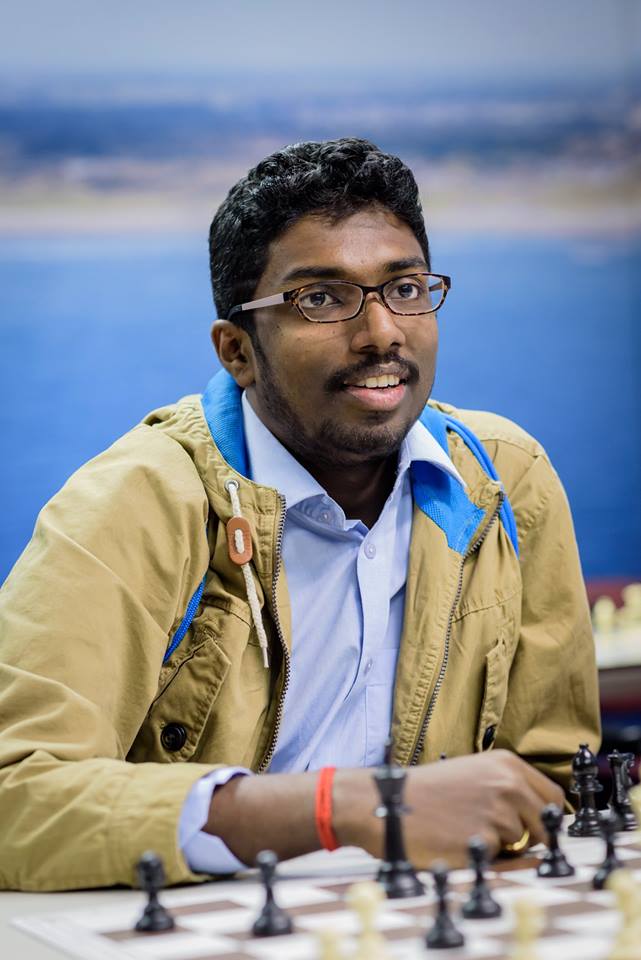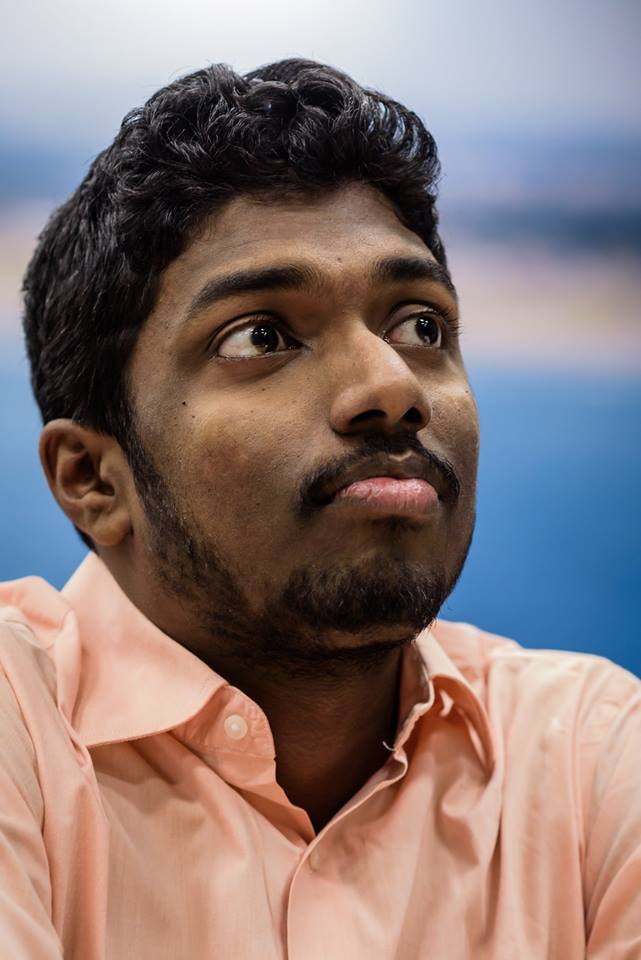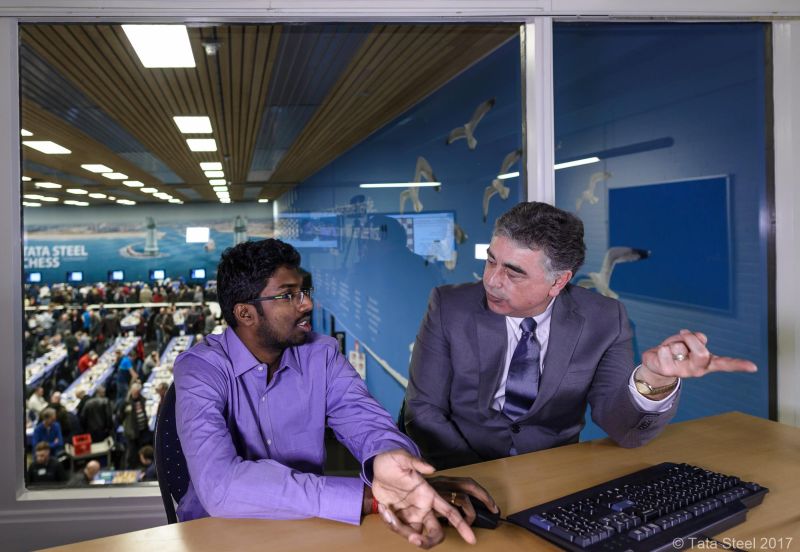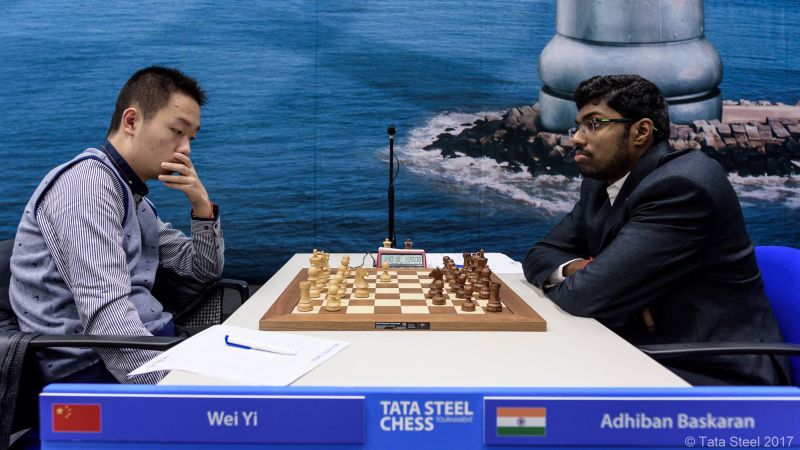Adhiban Baskaran interviewed (by his fans)!
Baskaran Adhiban is the pride of Tamil Nadu. A few years back, he became India's best bet to reach the top. Today, he is the hero of the entire chess world. Why? Because he plays differently, and fearlessly. And even this interview that we are presenting to you is different. We did not ask him the questions, but his Facebook fans did! Check out this unique 'Interview'.
Adhiban Baskaran interviewed (by his fans)!
All photos by Alina L'Ami
Baskaran Adhiban is the pride of Tamil Nadu. A few years back, he became India's best bet to reach the top. Today, he is the hero of the entire chess world. Why?
Because he plays differently, and fearlessly. And even this interview that we are presenting to you is different. We did not ask him the questions, but his Facebook fans did!
Check out this unique 'Interview' done on Facebook where fans asked Adhiban questions with the hashtag #AskAdhiban
Tournament preparation
Shailesh Dravid: How do you keep yourself motivated during a bad phase?
Adhiban Baskaran: Chess is my life and I devote all my energy to it. I know that if I keep up my work and do not give up in the bad times, the good times will soon arrive! In short, always be positive and never give up.
Basangwa Johnson: What is your favourite chess book and how do I become better?
AB: I have had many interesting chess books at different phases of my chess career. My System is one that I like very much.

Abhiram Parameswaran: What was your mindset before playing Sergey Karjakin and Magnus Carlsen? What strategy did you plan for them? Did you get nervous? In short, what was going through your mind before the start of the match?
AB: It was pretty simple, I wanted to beat them! I was positive and I wanted to show them the best chess that I could play.
Sayantan Sengupta: In a chess game what is the ratio of theoretical knowledge to developing new ideas on board for you And is it different for all players??
AB: Finding new ideas is my favourite pastime, hence out of ten, I would give 4:6. It is different for all players. Everyone has their own preferences.

Amin Shakya: I've heard a lot of chess players put themselves through rigorous physical regimes as well. (Vishy's known for his daily dose of yoga/meditation, swimming, and cycling.) Do you follow a similar physical training session?
AB: Yes for sure! Without that, it is difficult to maintain your form at this level!
Vikas Sn: Losing a game which one has to win isn't easy, and motivating self after that is a big pain since one is constantly reminded of the blunders one did. How do you deal with such mental blocks?
AB: So you lost a game which was important? First question you have to ask: can I change the outcome? No! What you can change is what happens after the loss and hence find the strength to concentrate on the present and future and use the past only for its learnings and to not repeat the same mistakes again!
Aditya Talekar: How did you manage to surprise your opponents in Tata Steel masters? #AskAdhiban
AB: By being unpredictable. And not being afraid to try new lines even against the strongest.
Tushar Saxena: I want to ask how many hours you do practice? Can you practice in night also? In chess, I saw that in night time we feel very tired to focus and concentrate on chess... How do you manage all this?
AB: I can easily work for 7 hours and more if required. Yes sometimes I do practice at night, but I try to finish before 12.30. Early to bed, early to rise is definitely the best approach. But figure out which routine works for you and follow it. How do I manage? because I feel this is where I belong and all my ambitions are related to chess!
Vijay: How do you calm yourself down after losing a won position?
AB: I think it is important to focus on your next game, because it is only after you win your next game, that you will be able to forget your previous loss. So all the energy should be put in that direction.
Chess Improvement
Nongsha Angom: I took a year off to prepare for Delhi Under-1600 but it was a disaster. Depressed and demotivated... Everyone around is humiliating. I didn't know what went wrong. Now it feels like quitting. How to overcome it?
AB: You will always know what went wrong, sometimes not accepting our mistakes could be our downfall. You need to face your past with courage and figure out what went wrong and take countermeasures and you can become stronger than you ever thought possible! Sometimes you will face difficult times but always believe it will pass... because it eventually will! Never give up.
Vipan Badshah: I message many players, even IM or GM. But they never replied. Thank you for your time. How do I prepare? Because I have no coach, no books but played many open tournaments.
AB: There are lots of training sites, DVDs and various books where you can find lots of positions to solve. Become sharper by trying to solve it constantly and then study classical players and world champions to get the chess culture and soon you will be ready!
BalaVidya Saravana: My son wants to be a Grandmaster. That's his dream. If in a paper, they ask him to draw something he draws a King and Queen. Whenever asked about his future dream he says that he wants to be a Grandmaster and become a World Champion. He practises well. He is very good at chess too. But at times, under pressure he starts making mistakes and loses from a winning position. How to overcome this problem?
AB: He gets the pressure to win either from his parents or people around him. Your job is figure out from where he gets the pressure and relieve it. Then there is really nothing stopping him anymore!
Gourish Biradar: How should a player of 1500 level improve in chess without any coaching?
AB: When I was starting my career, I used to solve a lot of tactics. I think at one point I had solved around 4000 problems and after that my results started to improve! Also also play games on the online platform and try to analyze them and learn from it. Also study classical players and try to emulate them!
Bharath Kumar: I haven't played any ELO rated tournaments yet. But I think if I play one, I would be in 1400-1600 rating. I want to improve my chess ability and be a good chess player in years to come. I think I am good in tactics but chess is more about construction of positions. So how should I improve my game so that I play better positional chess. Do you recommend any books or any methodologies to follow ?
AB: If you think you are good in tactics don't shy away from it and If you want to become stronger in positional and construction of plans/strategy, etc. then My system by Nimzowitsch is a good starting point.

Hasiholan Siregar: How do you prepare for a big tournament? Is there an equivalent to a boxer's sparring partner in chess?
AB: Yes I would say so, but luckily there is no danger of getting hurt physically. Though you have to be ready to overcome many mental scars!
Roel Bakker: How can you improve your mental play? Like your self-confidence in games and appearance to your opponents?
AB: First stop is to become a positive person with no negative feelings/thoughts. It will come from time to time but you should replace it with thoughts of excitement and belief in yourself! Never be afraid of your opponents no matter how strong they are. Believe it is possible to beat them irrespective of their rating and achievements.
Miscellaneous
Tejas Jayade: Many of the chess lovers including me want to make a career in chess which requires a complete attention to the game. But due to financial situation & the pressure of parents to acquire an educational degree, such a complete dedication isn't possible. My question is how to make sure that one can leave his academics & go after chess? What are the factors that one should see in himself to take such a dangerous risk?
AB: Yes, this is a big decision to take. I would say try to focus on chess whenever you get time and finish a normal degree. Then you can fully focus on chess because I feel life in chess is definitely better than one as an engineer—you can have your own deadlines. If you can achieve as a professional then great, otherwise life as a chess coach is also fine I think. And there are lots of jobs in oil companies, public sector and railways. So I feel life in chess is more happier than any other! I hope everyone pays attention to this answer, because it is what I get asked everywhere and the biggest challenge for parents to make the choice.
Punit Agrawal: What do you think about the evolution of chess engines, over the years? I believe engines kill the originality and innovation and the variety a chess game can have.The result also is affected. The world championship was an example. There were far too many draws. Chess is not meant for draws. It upsets me to a great deal. Fischer believed so too. He 'hated' chess for its prearrangement.
What are your thoughts, sir?
AB: Engines have changed our game to a whole new extent, but instead of complaining about the end of creative chess we must change ourselves to embrace the new era and adapt to the new circumstances. There were many draws in the world championship match because at that level they are worried if they take risk to change the balance they might lose and also draws can happen if both the opponents are evenly matched. So that's a more likely reason.

Girish Joshi: Experience vs. youth, who prevails?
AB: Very interesting question. I would say in the current generation, thanks to the computers, the youth is able to bridge the experience gap. The energy levels which the older generation lack aren't easy to replace.
Mandar Bakshi: What do you think chess is for people (chess players) psychologically? As Judit Polgar says chess is 30-40% psychology. What are your thoughts about it?
AB: I think the knowledge of chess is very useful in everyday life. It teaches you patience and the mentality to look at the situation with different mindsets. Yes, psychology plays a major role in chess, I would even go so far as to say the strongest players in our field were also people who were very strong mentally.
Ram Kumar: Is chess a game of pure intelligence. Can people with average IQ's become GMs and IMs and pursue chess as a profession?
AB: Yes chess is a game of intelligence. I believe all of us are born as equals. If one has been more successful or is claimed a prodigy, it is because he spent more time on the game and also he used his gifts better. So I believe it is possible for anyone to pursue chess as a profession and also become successful in it. But you should be willing to dedicate time for it and sacrifice many things to get what you want.
Pardeep Kumar Garg: How can I become a friend of yours?
AB: By approaching me in person the next time we meet and introducing yourself!
Special Prize Winner
ChessBase India is awarding a speical prize of 3 months of ChessBase Account to the most creative question that was asked to Adhiban. The winner was chosen by Adhiban himself.
The special prize goes to Adhiban's favorite question...
The winner may simply write to chessbaseindia@gmail.com to claim the special prize.

